As a vegan, it’s important to ensure that your meals are not only nourishing but also flavorful and diverse. Whether you are a seasoned vegan or new to the plant-based lifestyle, having a well-stocked pantry can make all the difference in preparing delicious, wholesome meals. Having these essential vegan kitchen ingredients on hand will enable you to explore the vast world of vegan cuisine, experiment with new recipes, and create culinary masterpieces that are both satisfying and cruelty-free.
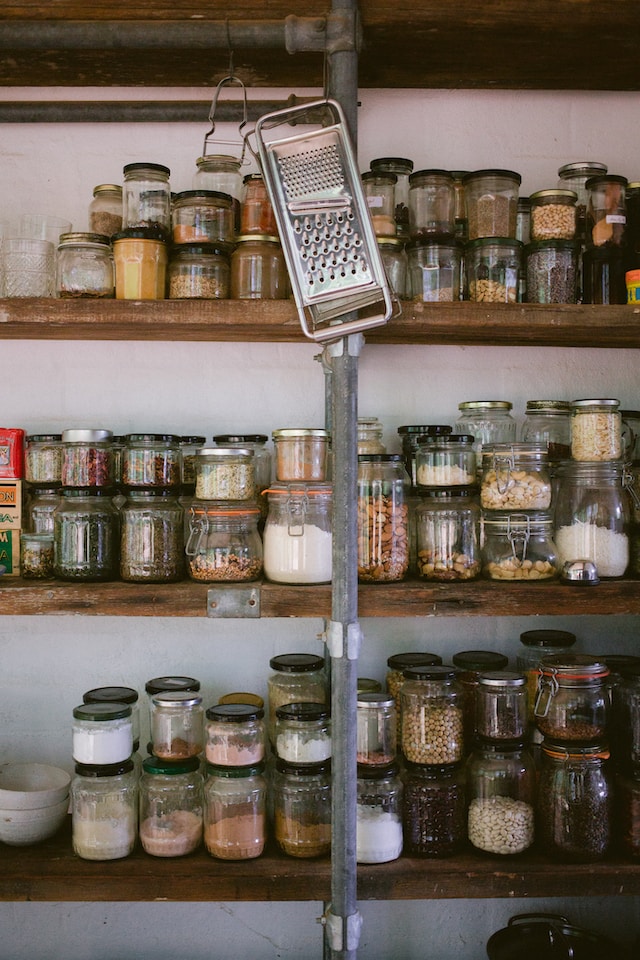
While the list of vegan kitchen staples may vary from person to person, we have carefully curated a selection that encompasses a wide range of flavors, textures, and nutritional benefits. From the humble beans to the versatile spices, these ingredients will be your culinary arsenal, bringing endless possibilities to your table.
Stocking your pantry with these essentials will not only provide you with the building blocks for tasty vegan meals but also ensure that you have a good balance of essential nutrients. From proteins to vitamins and minerals, these vegan kitchen ingredients will help you maintain a well-rounded and healthful vegan diet.
Pantry Staples
When it comes to stocking your vegan pantry, there are a few staple vegan kitchen ingredients that you’ll want to have on hand for a variety of dishes. These pantry essentials will not only provide the foundation for your meals but also add depth and flavor to your culinary creations. Let’s take a look at some of the must-haves:
Pantry Staples
Building a well-stocked vegan pantry is essential for creating delicious and nutritious meals. Here are some must-have pantry staples that will contribute to the foundation of your culinary creations.
Grains and Flours
Rice, Quinoa, and Whole Wheat Flour: These versatile staples are a fantastic base for many vegan dishes. Rice pairs well with curries and stir-fries, while quinoa is a protein-packed alternative for salads and grain bowls. Whole wheat flour is perfect for baking bread and pastries, adding a nutty flavor and a boost of fiber to your creations.
Alternative Flours (e.g., Almond, Chickpea): Adding variety to your flour selection opens up a world of culinary possibilities. Almond flour is great for gluten-free baking and adds a mild nutty taste to your baked goods. Chickpea flour, also known as gram flour, is ideal for making vegan omelets or fritters, offering a unique texture and taste.
Legumes and Pulses:
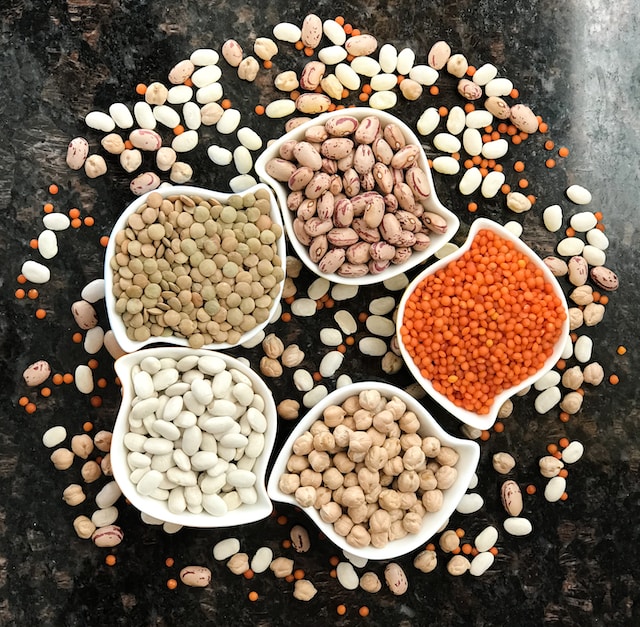
Lentils, Chickpeas, and Black Beans: These legumes are a fantastic source of plant-based protein, fiber, and essential nutrients. Lentils can be used in soups, stews, and even veggie burgers, while chickpeas make delicious hummus and curries. Black beans work well in Mexican-inspired dishes, such as tacos and chili. They are a versatile addition to any vegan pantry.
Dried vs. Canned Legumes: Both dried and canned legumes have their advantages. Dried legumes are more budget-friendly and allow you to control the seasoning and texture. They do require longer cooking times. On the other hand, canned legumes are convenient and save you time in the kitchen. Ensure you rinse them before use to remove excess sodium.
Nuts and Seeds
Almonds, Walnuts, and Chia Seeds: Nuts and seeds are not only nutritious but also add texture and flavor to your vegan dishes. Almonds and walnuts are packed with healthy fats and can be enjoyed raw, toasted, or ground into a flour for baking. Chia seeds are a vegan’s best friend, providing omega-3 fatty acids, fiber, and a gel-like texture when mixed with liquid, making them perfect for puddings and smoothies.
Nut and Seed Butters: Almond butter, peanut butter, and tahini (sesame seed paste) are essential components of a vegan pantry. They are versatile ingredients that can be used in both sweet and savory recipes. Whether you’re making dressings, sauces, or spreading them on toast, these butters add creaminess and a burst of flavor to your dishes.
Plant-Based Proteins
As a vegan, ensuring that you consume an adequate amount of protein is crucial for maintaining a balanced and nourishing diet. Fortunately, there are plenty of plant-based sources of protein that can easily be incorporated into your meals.
Tofu and Tempeh
Tofu and tempeh, derived from soybeans, are popular plant-based protein alternatives that can be used in a variety of dishes. Tofu is known for its versatility, absorbing flavors and taking on various textures depending on how it is prepared.
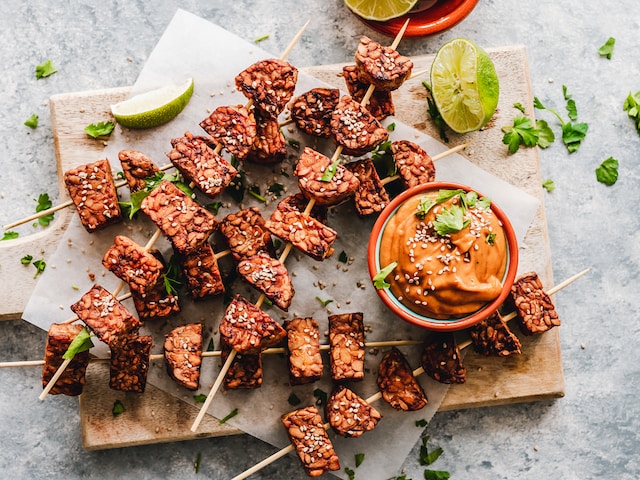
You can use it in stir-fries, curries, or even bake it for a crispy texture. Tempeh, on the other hand, has a nutty flavor and a firm texture, making it a great choice for grilling or slicing into sandwiches.
Seitan and Mock Meats
Seitan, also known as wheat meat, is a protein-rich food made from gluten. It has a meaty texture and can be flavored to mimic various meats, such as chicken, beef, or sausage. Mock meats, which are plant-based alternatives to animal meats, are also a great addition to a vegan pantry. These include veggie burgers, sausages, and deli slices made from ingredients like soy, mushrooms, or lentils. These options provide a familiar taste and texture for those transitioning to a vegan lifestyle or craving a meaty flavor.
Dairy Alternatives
One of the biggest concerns for many people considering a vegan lifestyle is how to replace dairy products like milk, cheese, and yogurt. Luckily, there are now plenty of delicious and nutritious dairy alternatives available that can be easily incorporated into your vegan kitchen. These dairy alternatives not only offer a similar taste and texture but also provide important nutrients like calcium and vitamin D. Here are some popular dairy substitutes to have in your pantry:
- Plant-Based Milks: Plant-based milks, such as almond, soy, oat, or coconut milk, are fantastic alternatives to dairy milk. They can be used in cooking, baking, or enjoyed on their own. Each milk variety has its own unique flavor profile and consistency, so feel free to experiment and find the one that suits your taste preferences.
- Vegan Cheese: While it’s true that vegan cheese may not perfectly replicate the taste and texture of dairy cheese, there are now many varieties available that come pretty close. From cashew-based melts to soy-based slices, there is a vegan cheese option for every need. Use them in sandwiches, pasta dishes, or as a topping for pizzas.
- Non-Dairy Yogurt: Just like traditional yogurt, non-dairy yogurt provides a creamy and tangy base for your breakfast bowls or snacks. Made from ingredients like almond, coconut, or soy milk, non-dairy yogurts often contain probiotics to support gut health. Experiment with different flavors and find your favorite combination.
- Creamy Spreads: For those who enjoy creamy spreads on their sandwiches or crackers, there are now wonderful plant-based options available. From cashew-based cream cheese to spreads made from chickpeas or avocado, these alternatives are not only delicious but also packed with nutrients.
- Butter Alternatives: Vegan butter alternatives, made from plant oils like coconut, avocado, or olive, offer a similar richness and flavor to dairy butter.
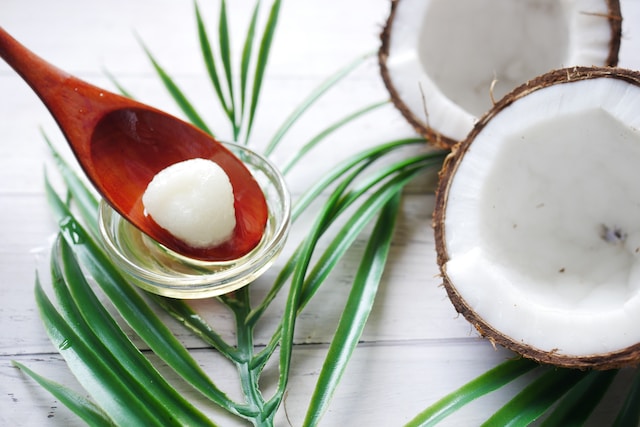
They can be used in baking, cooking, or spread on toast. Some vegan butters are also available in convenient stick form, making them easy to measure and use.
Flavor Enhancers
When it comes to elevating your vegan dishes and adding that extra burst of flavor, a well-stocked pantry should include a variety of seasoning and condiments. These flavor enhancers can transform a simple meal into a culinary delight, making your taste buds dance with joy. Let’s dive into some of the essentials:
- Herbs and Spices: A wide selection of herbs and spices is key to creating depth and complexity in your vegan cooking. From basil to thyme, cilantro to rosemary, these aromatic plants can be used fresh or dried to enhance the flavors of your dishes. Spices like paprika, turmeric, cumin, and cinnamon add warmth and earthiness to both savory and sweet recipes. Don’t be afraid to experiment with different combinations to find your signature flavors.
- Soy Sauce and Tamari: Soy sauce and tamari, a gluten-free alternative, are fantastic umami-rich vegan kitchen ingredients that add depth and savory notes to your stir-fries, marinades, and dressings. Their rich, salty flavor complements a wide variety of vegan dishes and helps create a more complex taste profile.
- Nutritional Yeast: Nutritional yeast, also known as “nooch,” is a popular vegan staple that adds a cheesy, nutty flavor to all sorts of dishes. It’s a rich source of important nutrients like B vitamins, including vitamin B12, which can be challenging to obtain on a vegan diet. Sprinkle nutritional yeast on pasta, popcorn, or roasted vegetables for an extra boost of umami goodness.
- Vinegars: Vinegars such as balsamic, apple cider, and rice vinegar are versatile ingredients that can add acidity and balance to your recipes. Balsamic vinegar, with its slightly sweet and tangy taste, is great for drizzling over roasted vegetables or adding to dressings. Apple cider vinegar is known for its health benefits and can be used in cooking or as a tangy addition to beverages. Rice vinegar is commonly used in Asian cuisine and is perfect for making refreshing salads and pickles.
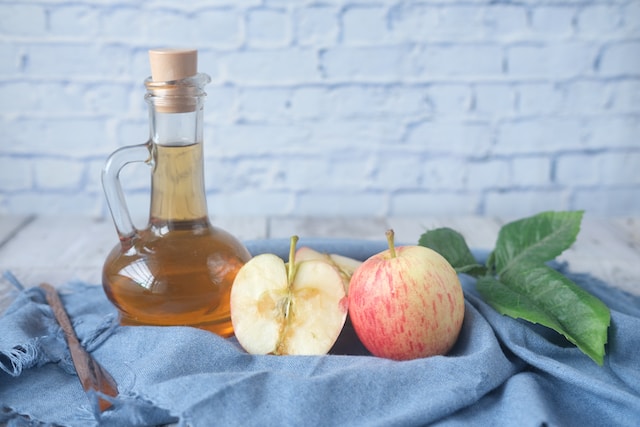
- Sauces and Condiments: A variety of sauces and condiments can take your vegan meals to the next level. Salsa, hot sauce, sriracha, and mustard can add a spicy kick, while tahini, miso paste, and coconut aminos bring unique flavors to your dishes. Pesto, made with basil or other leafy greens, garlic, nuts, and olive oil, is a versatile sauce that adds a burst of freshness and herby goodness.
- Salt and Pepper: Last but certainly not least, salt and pepper are the fundamental seasonings that no kitchen should be without. Salt enhances flavors, brings out the natural sweetness of ingredients, and balances bitterness, while pepper adds a subtle heat and depth to your dishes. Use them sparingly and taste as you go to achieve the perfect balance of seasonings.
Now that we’ve covered the essential vegan pantry items for building a flavor-packed kitchen, it’s time to get creative in the culinary realm. With these vegan kitchen ingredients at your fingertips, you have the tools to create delicious, nourishing, and cruelty-free meals that will impress even the most discerning palates. So grab your apron, sharpen your knives, and let your imagination run wild, because the possibilities in the vegan kitchen are endless. Happy cooking!